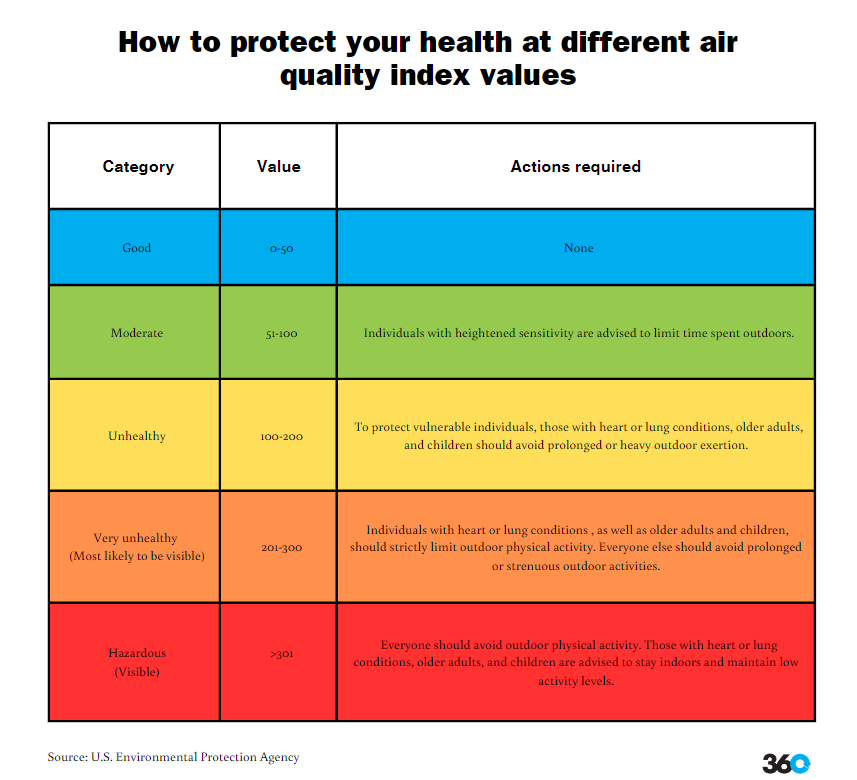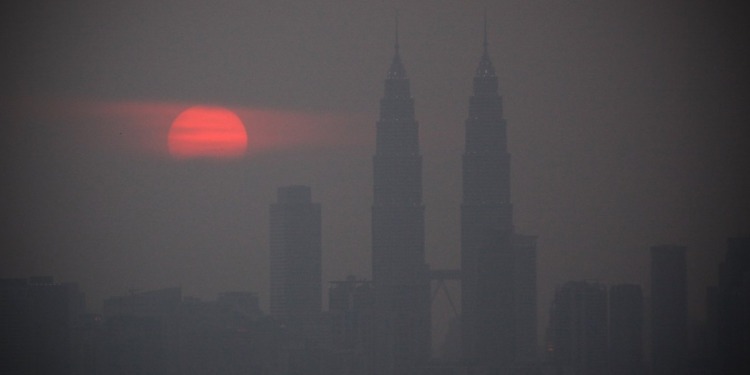While the air quality index is a useful tool, it has its limitations. There’s still a greater need for robust monitoring to ensure cleaner air.
Imagine you’re walking through polluted city streets. Despite wearing a N95 mask, you can still smell the smoky, sulphuric, gassy, solvent-like air. The pollution is so bad you can even taste the air’s oily, dirty residue. The skyline is obscured by a thick layer of smog, transforming the horizon into a hazy, fog-laden panorama.
From the annual transboundary haze shrouding Southeast Asia for decades to Delhi’s recent acrid smog, a toxic tide of air pollution is choking cities worldwide. Beijing’s winter smog, a noxious cocktail of traffic fumes and factory spew, paints a horrifying picture: this invisible enemy isn’t a distant threat, it’s in the air we breathe.
The main sources of these air pollutants are exhaust emissions, incomplete combustion of fossil fuels, power stations and industrial activities, all of which result in harmful chemicals and pollutants blanketing the air.
Air pollutants are categorised as primary pollutants (environmentally damaging materials produced by man-made or natural processes) and secondary pollutants (products of chemical changes of the primary pollutants). Usually colourless and odourless, air pollutants are an invisible threat which poses a grave risk to public health, our ecosystems, and the delicate equilibrium of our planet.
A way to keep track of air pollution daily is by understanding how to minimise our exposures using readings of the Air Quality Index (AQI), also sometimes referred to as Air Pollution Index (API). This is the global language used for assessing air quality conditions. It informs people how clean or polluted the air is based on a simple number from a scale of 0-500 with known impact to human health.
Thirty-seven of the 40 most polluted cities in the world are in Southeast Asia with almost 99% of the population living in areas where the WHO has deemed the air quality to be unsafe due to pollution.
Our health is intricately linked to what we breathe. Just like smoking, breathing unclean air is equally bad. Just like how smoking is bad for our health, breathing in unclean air is equally bad.
Polluted air particles can cause irritation, swelling and inflammation in our nose, throat, sinuses, eyes and in our lungs. Gut microbiota is also affected. For babies and children with developing lungs, people living with pre-existing medical conditions such as heart disease, people with disabilities, and the elderly, poor quality air can have serious and lasting implications such as emphysema, asthma, chronic obstructive pulmonary disease and even some cancers such as lung, breast and pancreatic cancers.
The number on the scale is based on concentrations of chemical pollutants of any given day into one reading. The reading takes account of all the major air pollutants, including particulate matter, ground level ozone, carbon monoxide, sulphur dioxide and nitrogen dioxide.
Daily reading allows the government and the public to understand the air quality surrounding them and when the air quality is at its best or worst, helping people to make their own choices about when to venture out or avoid going out.
An air quality index is useful in indicating the condition of air quality which reflects the effect on human health and is easily understood by the public. Each index value corresponds to a colour-coded category and specific health risks
Five major pollutants are used in calculating air quality. The calculation is based on the Pollution Standard Index (PSI) that has been used and accepted internationally. It involves measuring pollutant concentrations, applying specific formulas, and interpreting the results to provide a simple, colour-coded scale.
 The continuous air quality monitoring stations record hourly concentrations of the major pollutants. Following their different averaging time, the concentrations of each primary pollutant is converted into a sub-index using a specific mathematical equation following the requirement of country specific ambient air quality standards breakpoints.
The continuous air quality monitoring stations record hourly concentrations of the major pollutants. Following their different averaging time, the concentrations of each primary pollutant is converted into a sub-index using a specific mathematical equation following the requirement of country specific ambient air quality standards breakpoints.
These standards are the Malaysian Ambient Air Quality Standard (MAAQS) for Malaysia, the National Ambient Air Quality Standard (NAAQS) in the US, and the National Environmental Protection (Ambient Air Quality) Measure (NEPM) in Australia. When a specific sub-index for each primary pollutant is calculated, the highest sub-index is determined as the air quality for the particular time period.
An air quality index is a useful tool, but it has limitations. Index values can differ from country to country due to variable emission sources, meteorological conditions and environmental regulation and enforcement.
Related Articles: How Polluted Is the Air in Europe? | Why the EU Parliament Vote on Cleaner Air Rules Is Not Enough | Air Pollution is Leading Environmental Killer, Claiming 7 Million Lives | Air Pollution in Europe: Exposure Kills 1,200 Children Every Year
The specific formulas used to convert their concentrations into sub-indexes can differ in the weighting of the pollutants, the different standard breakpoints used in different countries, which means the same concentration of a pollutant might trigger a higher or lower sub-index depending on the local standards.
As the air quality index focuses on five primary pollutants, it may not capture emerging threats like ultrafine particles which can penetrate deeper into our lungs and bloodstream.
These ultra fine particles can cause various health impacts.
They are volatile organic compounds which contribute to formation of surface ozone; and airborne heavy metals like lead, arsenic and chromium which can cause damage to organs and nervous system. An index gives an overall number and does not take into account how different people’s exposure can be depending on things like where they are and how active they are.
While the air quality index provides a valuable metric for quantifying air pollution and its public health implications, there are limitations.
By advocating for stricter regulations, adopting sustainable practices and encouraging collective action, we can claim our right to clean air — a lifeline not only for our lungs, but also for the future of our planet and its diverse inhabitants.
** **
This article was originally published by 360info™.
Editor’s Note: The opinions expressed here by the authors are their own, not those of Impakter.com — Featured Photo Credit: Firdaus Latif/Wikimedia Commons.










